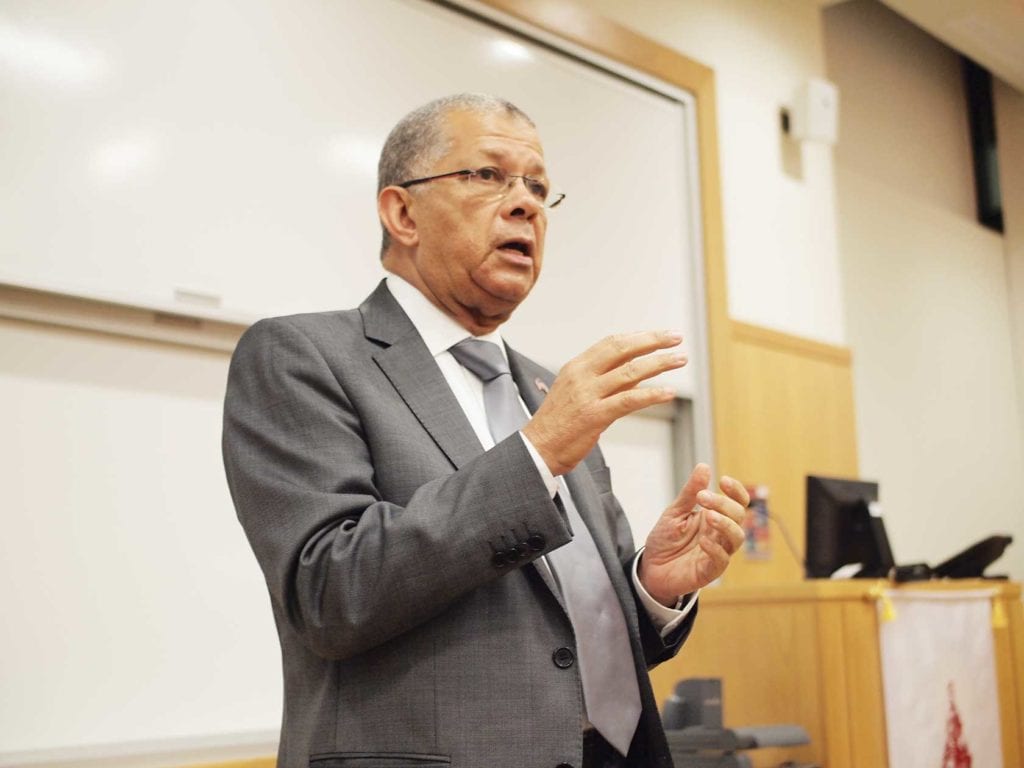Ambassador: Cape Verde on the right track
Nation’s economy seen growing, political system is open, stable

Cape Verde’s democratic structures are in good health 43 years after the West African archipelago won its independence from Portugal, the nation’s ambassador to the U.S., Carlos Veiga, told an audience at Bridgewater State University Oct. 25.
Veiga, who served as prime minister from 1991 to 2000, told an audience at the university that the country has effectively managed its transition from colony to single-party rule to multiparty democracy without the coups d’etat or civil unrest that plague many developing nations.
“Today, Cape Verde is a politically and economically stable democracy,” he said.
Veiga, who served as a judge in post-independence Cape Verde, noted that Cape Verde has moved from the state-run economy implemented by the African Party for the Independence of Cape Verde (PAICV) to a free-market economy championed by his Movement for Democracy (MPD) when it took power in 1991.
During the years of MPD rule, the country saw 8 percent annual growth in its economy, although the party came under fire from many in the country for its aggressive privatization of state assets. During the nine years MPD was in power, the country also developed its tourism sector, with local and international firms constructing hotels and resorts.
Three-quarters of the nation’s economy is based on the service industry with tourism, commerce and transportation the most important sectors. Remittances from Cape Verdeans living abroad provide an important source of revenue for the country and help offset a $500 million-plus trade deficit for the country, which imports most of its food.
Economy
In his remarks, Veiga pointed to positive trends in Cape Verde and on the African continent. He cited relatively strong growth in Cape Verde’s economy — an 8 percent growth rate during the first nine years of the MPD government and 5 percent in recent years. As a major transit and trade hub, Veiga said, Cape Verde is poised to benefit from potential growth in population and the planned African free trade zone, which, if successful, will allow goods and services to travel across the continent without tariffs.
“In African free trade, our position will be in services,” he said. “We can be a bridge to Africa.”
While Veiga noted that there are significant challenges facing the growth of African countries’ economies, including high poverty rates, military conflicts and a lack of democratic governing structures, the transparency and openness in Cape Verde’s governance puts the nation in a favored position, with its major challenge being a lower-than-optimal participation rate in elections.
Deomocracy
“Our country is committed to close the gap and become the most democratic African country,” Veiga said.
Veiga said Cape Verde’s pluralism is one of its strengths. Its inhabitants are the descendants of the Portuguese colonizers who were the first to settle the island in the 15th century, the Africans they brought to the islands in slavery and other communities who immigrated over the centuries.
“We currently have a project for the preservation of Jewish cemeteries funded by a Muslim country — Morocco — in a predominantly Christian country,” he said. “We are a very tolerant society. Being able to have all religions live side-by-side is important for our stability.”
As part of the political reforms ushered in in 1991, Cape Verdeans emigrants were given the right to vote in national elections. There are currently 560,000 people living on the nine inhabited islands of the archipelago nation, and a larger number living in its diaspora — principally in the New England region of the United States, in Senegal and in Portugal.
International relations
At last week’s event, members of the Massachusetts Cape Verdean community questioned Veiga on a variety of issues, including increasing investment from China in the archipelago.
“China has been a partner with Cape Verde since independence,” Veiga told the audience, citing Chinese support for public health projects, scholarships for Cape Verdeans to study in China and Chinese financing for public infrastructure projects.







